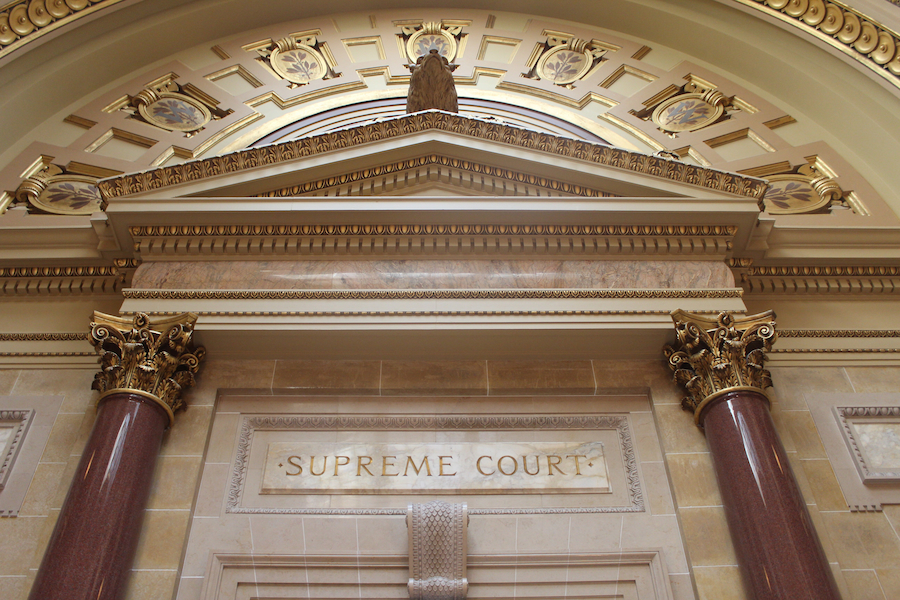SCOTUS Kicks Off Term With Oral Arguments in Four Cases

The U.S. Supreme Court heard its first oral arguments of the 2022-2023 Term. The four issues before the justices ranged from unclaimed MoneyGram checks to the EPA’s authority under the Clean Water Act. The hearings marked the first time the public has been allowed to attend since the pandemic began in March 2020.
The Court also welcomed new Justice Associate Justice Ketanji BrownJackson to the bench for her first session of oral arguments. While Justice Jackson has been a member of the Court since being sworn in on June 30, the Court held a special sitting on September 30, 2022 to hold the formalinvestiture ceremony.
Below is a brief summary of the cases before the Court:
Delaware v. Pennsylvania and Wisconsin: The case centers on what should happen to uncashed checks issued by MoneyGram, which is the second largest money transfer company in the world. The Supreme Court has agreed to consider the following questions: (1) Whether MoneyGram Official Checks are “a money order, traveler’s check, or other similar written instrument (other than a third party bank check) on which a banking or financial organization or a business association is directly liable,” pursuant to 12 U.S.C. § 2503; (2) whether the court should command Wisconsin and Pennsylvania not to assert any claim over abandoned and unclaimed property related to MoneyGram Official Checks; and (3) whether all future sums payable on abandoned MoneyGram Official Checks should be remitted to Delaware.
Sackett v. Environmental Protection Agency: The closely watched case asks the Supreme Court to clarify the extent of EPA’s authority with regard to wetlands under the Clean Water Act. In Rapanos v. United States, 547 U.S. 715 (2006), the Court held that the CWA does not regulate all wetlands. However, the divided Court could not agree on the proper standard. The current question before the Court is “[w]hether the U.S. Court of Appeals for the 9th Circuit set forth the proper test for determining whether wetlands are ‘waters of the United States’ under the Clean Water Act, 33 U.S.C. § 1362(7).”
Arellano v. McDonough: The case involves whether the doctrine of equitable tolling applies to a statute governing veteran benefits. The justices will decide two questions: (1) Whether the rebuttable presumption of equitable tolling from Irwin v. Department of Veterans Affairs applies to the one-year statutory deadline in 38 U.S.C. § 5110(b)(1) for seeking retroactive disability benefits, and, if so, whether the government has rebutted that presumption; and (2) whether, if 38 U.S.C. § 5110(b)(1) is amenable to equitable tolling, this case should be remanded so the agency can consider the particular facts and circumstances in the first instance.
Merrill v. Milligan: The voting rights challenge centers on the State of Alabama’s redistricting plan, which challengers contend violates the Voting Rights Act by diluting the votes of the state’s Black residents. The specific question the Court will decide is” [w]hether the state of Alabama’s 2021 redistricting plan for its seven seats in the United States House of Representatives violated Section 2 of the Voting Rights Act.”
Previous Articles
SCOTUS Decision in Bowe v. United States Is First of the 2026 Term
by DONALD SCARINCI on February 5, 2026
In Bowe v. United States, 607 U.S. ___ (2026), the U.S. Supreme Court held that Title 28 U.S.C. § ...
SCOTUS Rules State Can’t Immunize Parties from Federal Civil Liability
by DONALD SCARINCI on January 29, 2026
In John Doe v. Dynamic Physical Therapy, LLC, 607 U.S. ____ (2025) the U.S. Supreme Court held that...
Supreme Court to Address Racial Discrimination in Jury Selection
by DONALD SCARINCI onWhile the U.S. Supreme Court has concluded oral arguments for the year, it continues to add cases t...
The Amendments
-
Amendment1
- Establishment ClauseFree Exercise Clause
- Freedom of Speech
- Freedoms of Press
- Freedom of Assembly, and Petitition
-
Amendment2
- The Right to Bear Arms
-
Amendment4
- Unreasonable Searches and Seizures
-
Amendment5
- Due Process
- Eminent Domain
- Rights of Criminal Defendants
Preamble to the Bill of Rights
Congress of the United States begun and held at the City of New-York, on Wednesday the fourth of March, one thousand seven hundred and eighty nine.
THE Conventions of a number of the States, having at the time of their adopting the Constitution, expressed a desire, in order to prevent misconstruction or abuse of its powers, that further declaratory and restrictive clauses should be added: And as extending the ground of public confidence in the Government, will best ensure the beneficent ends of its institution.





